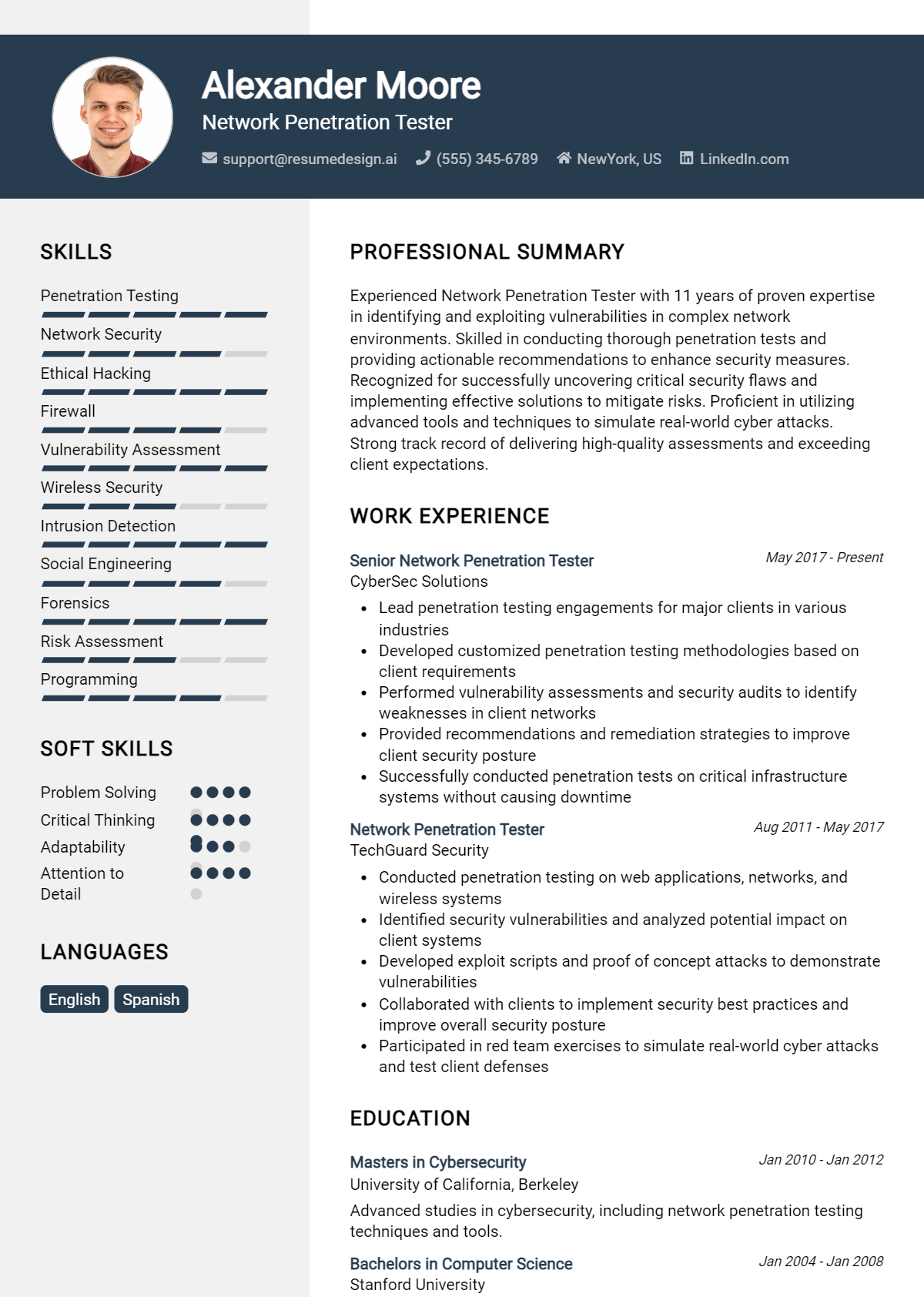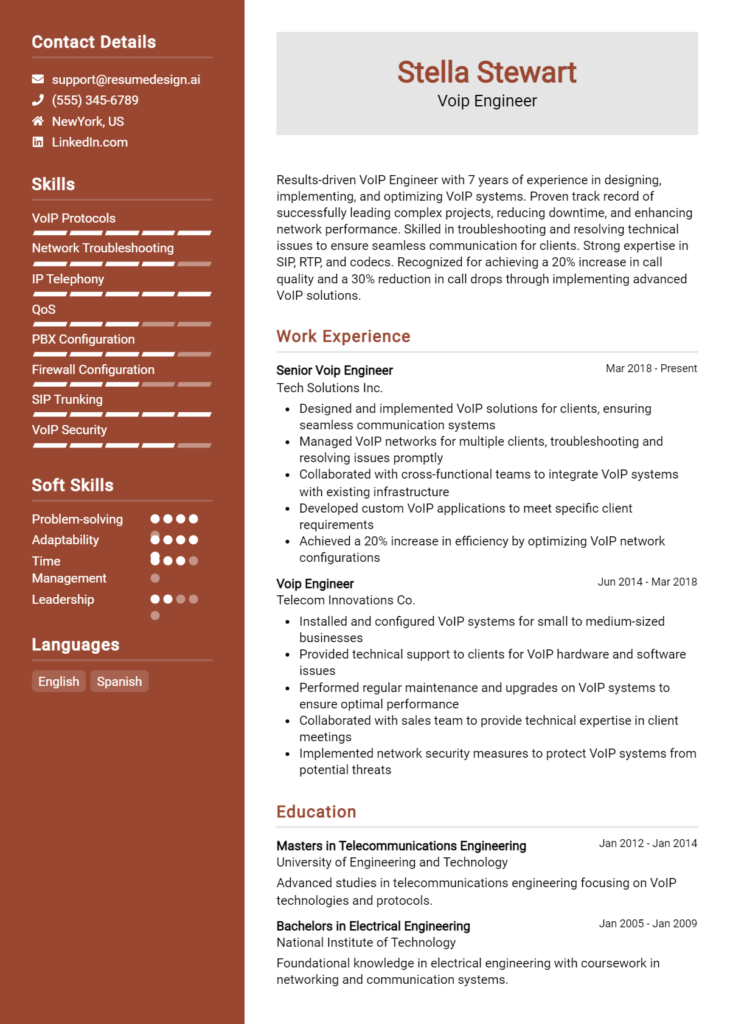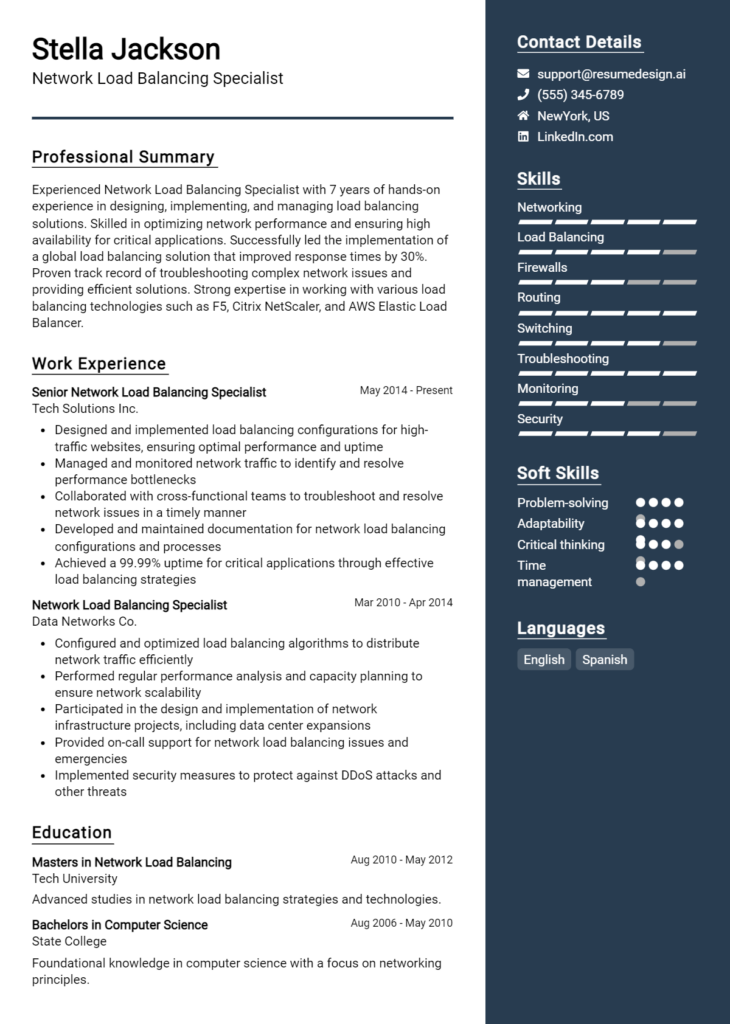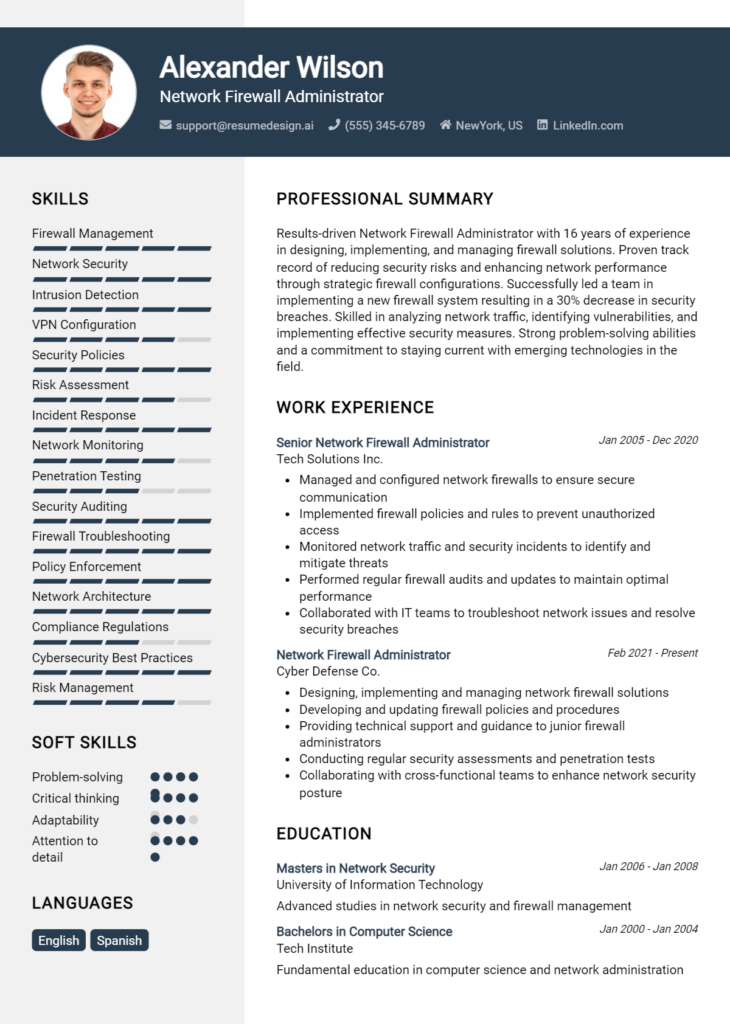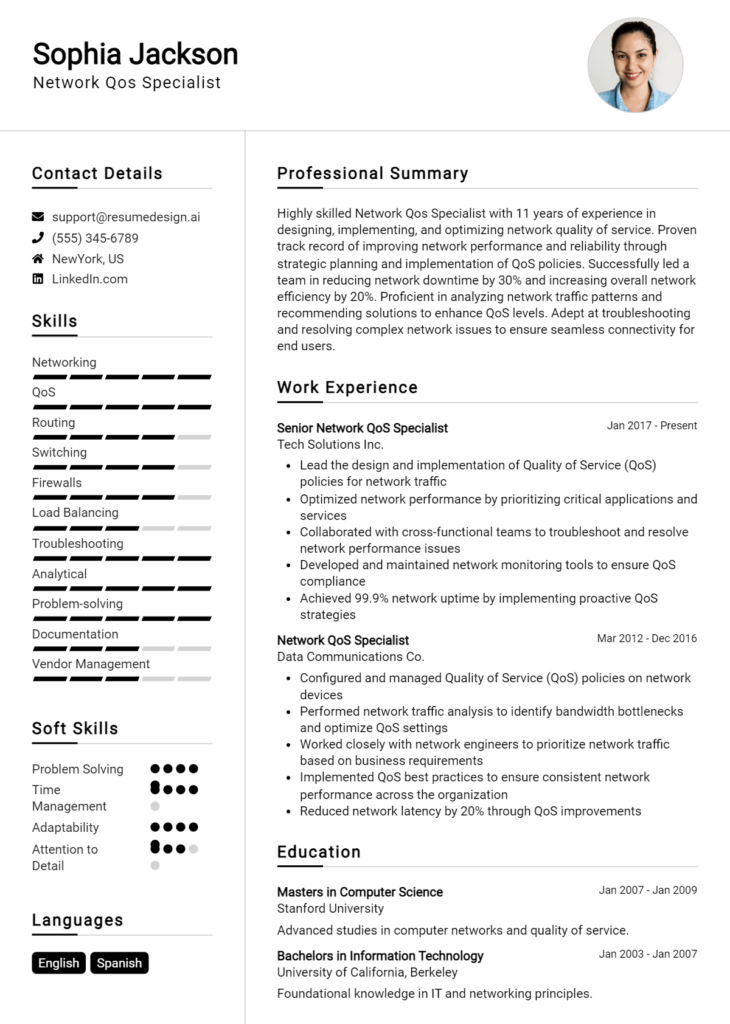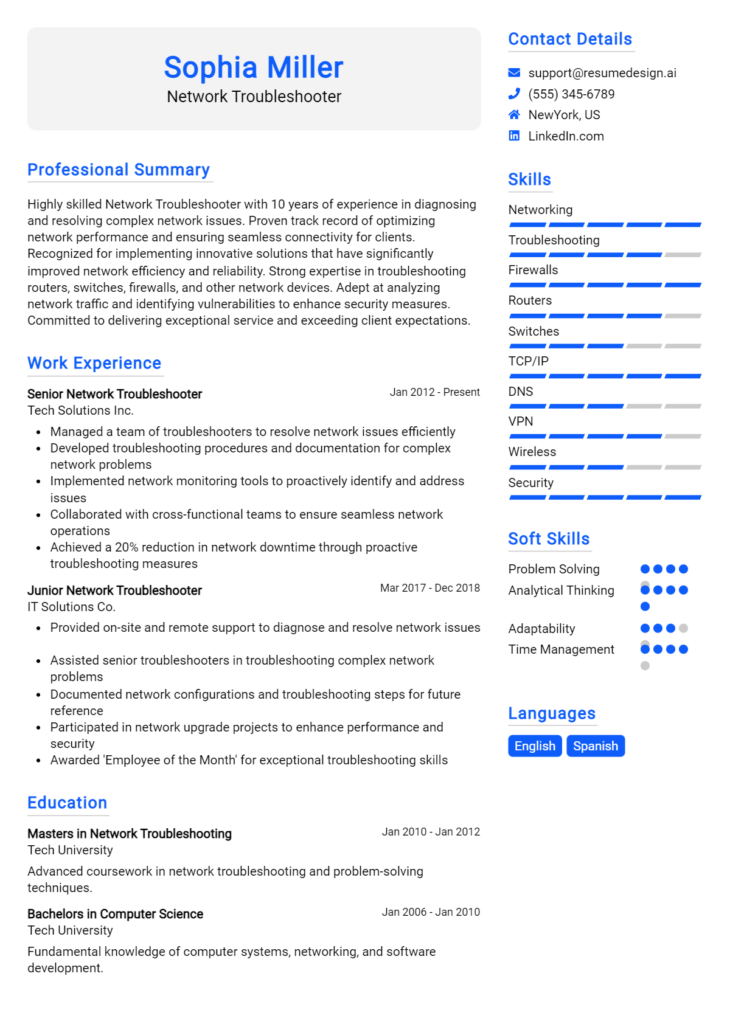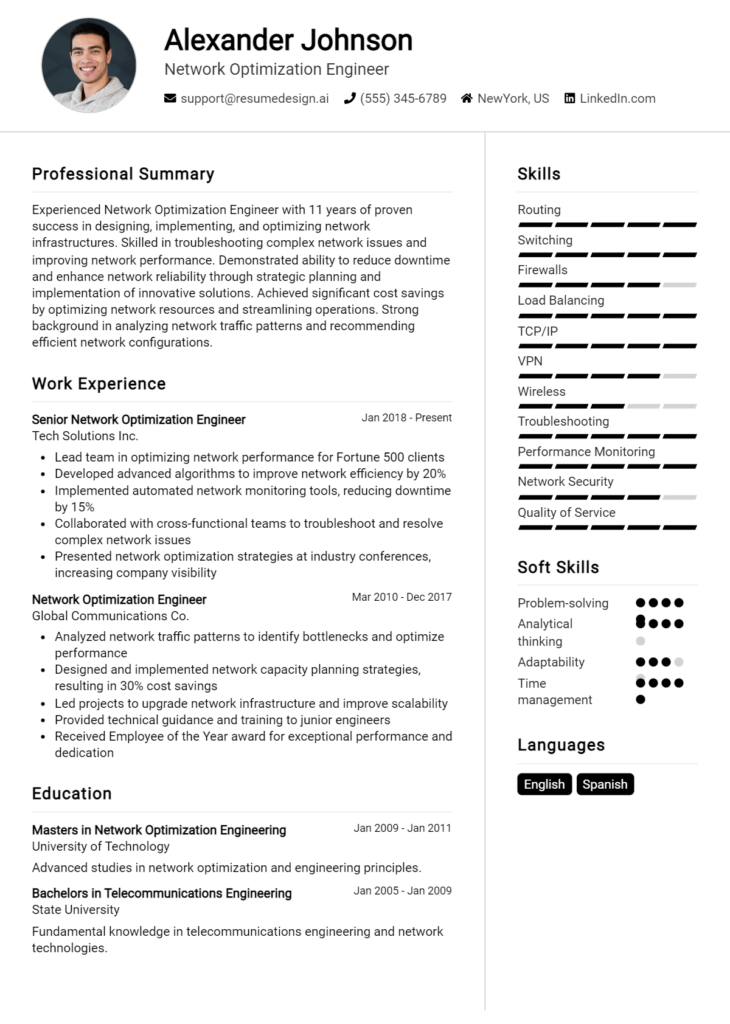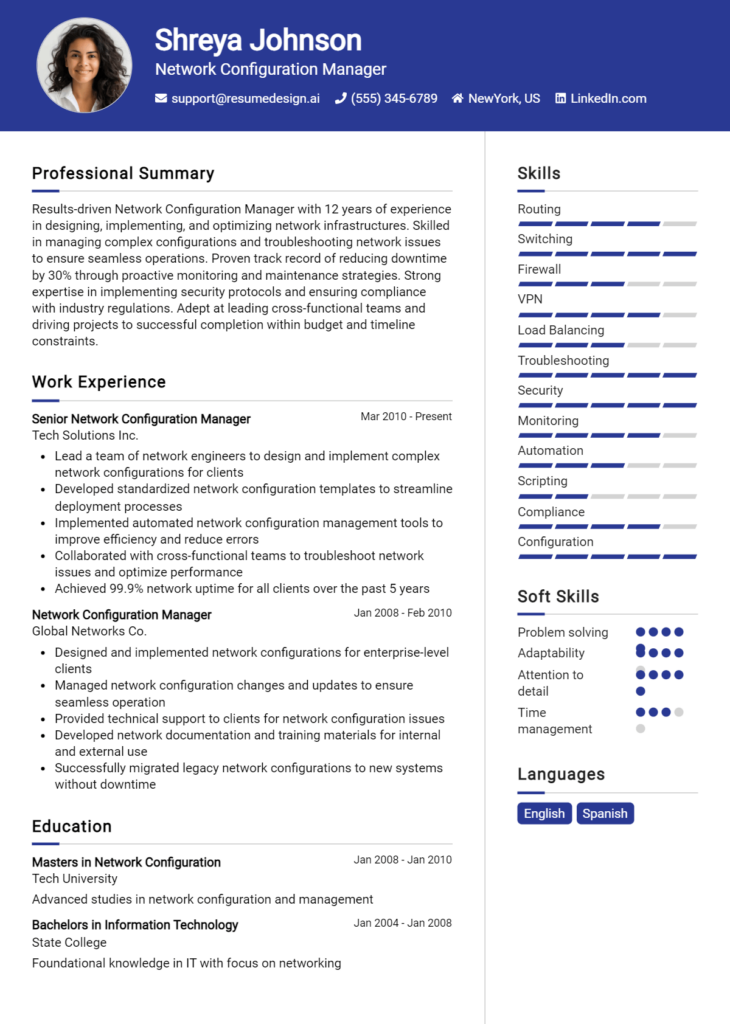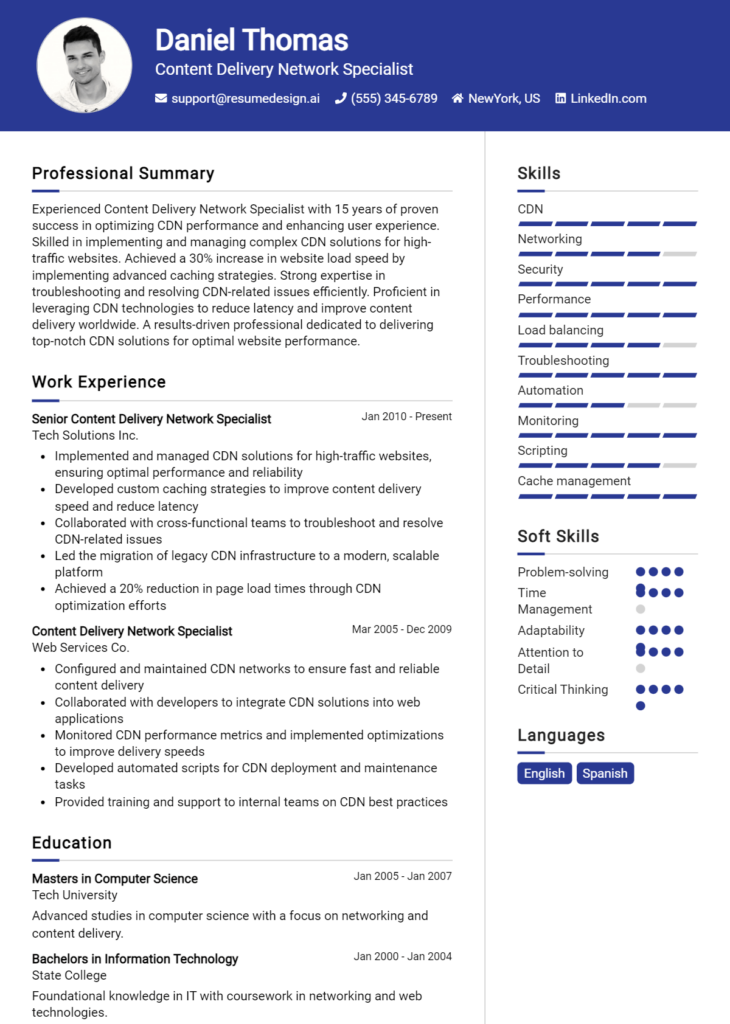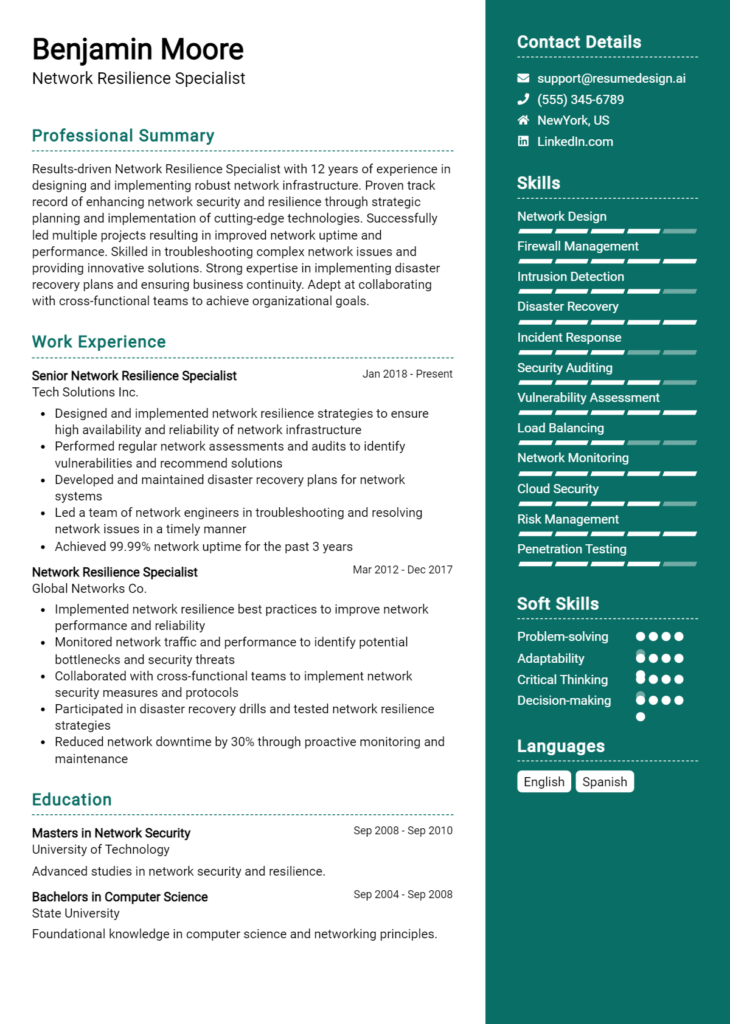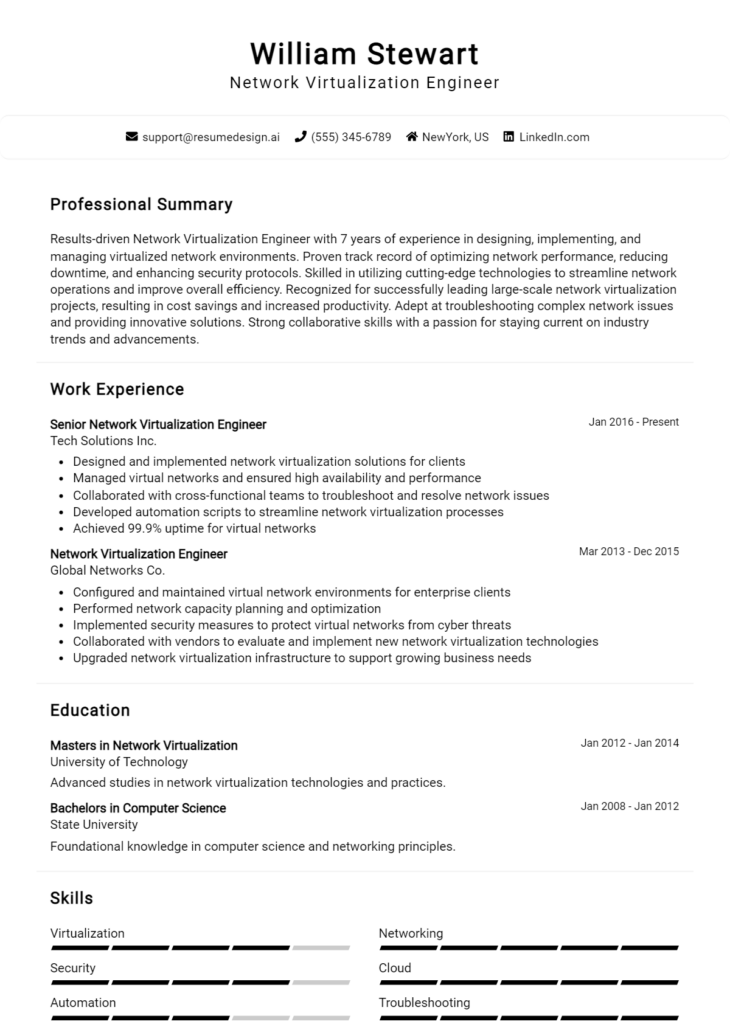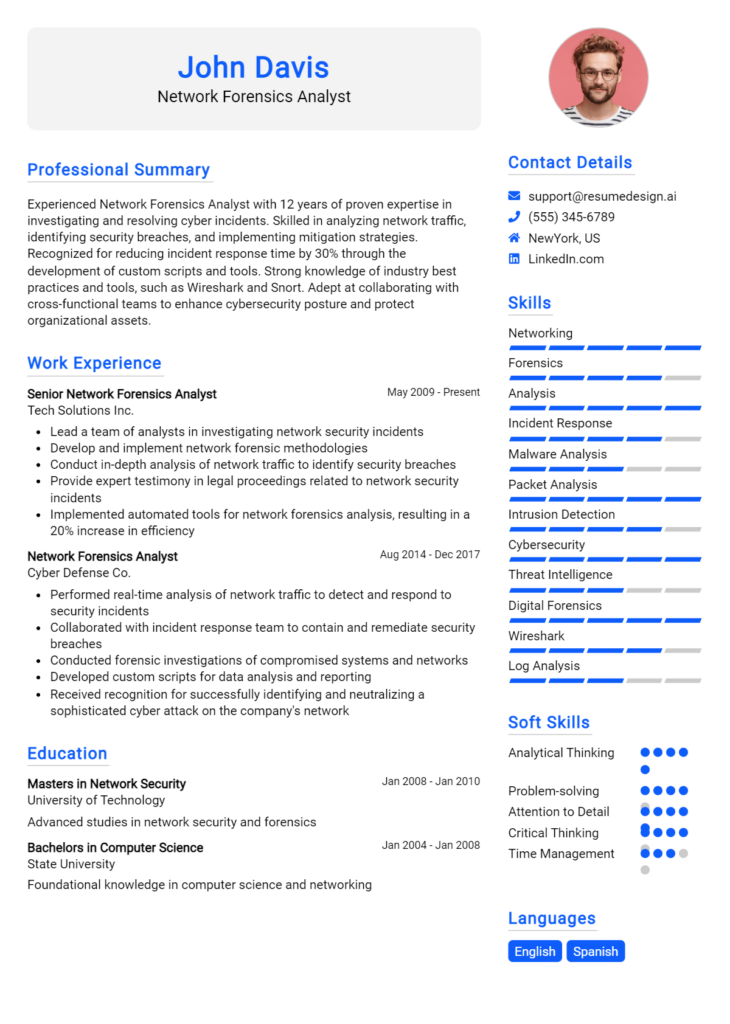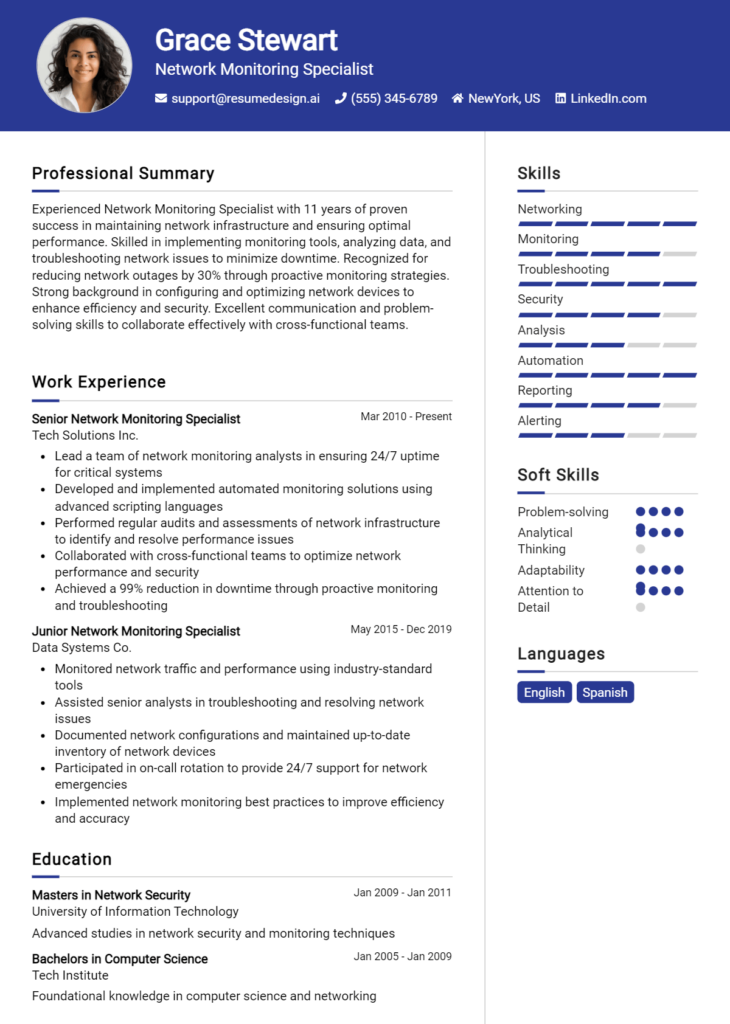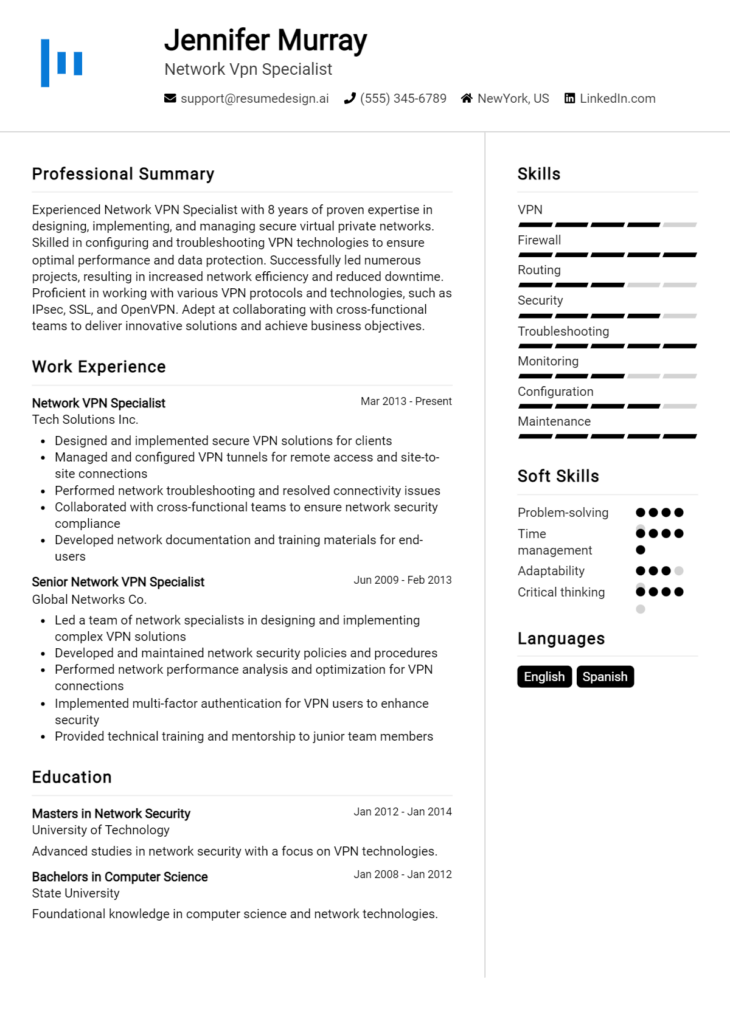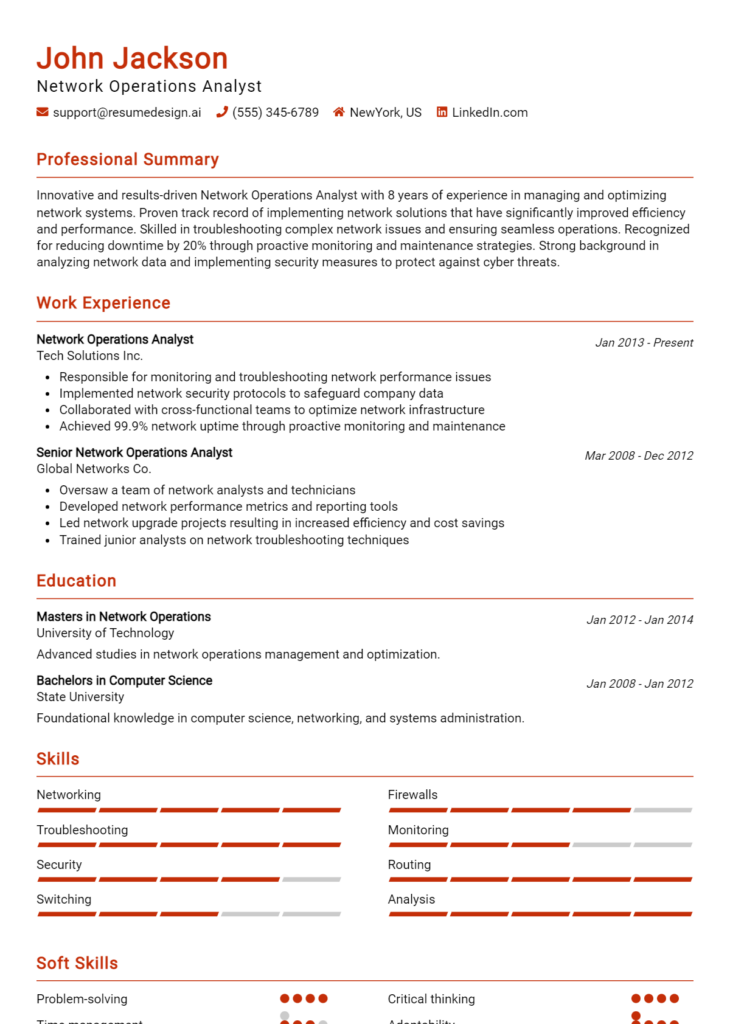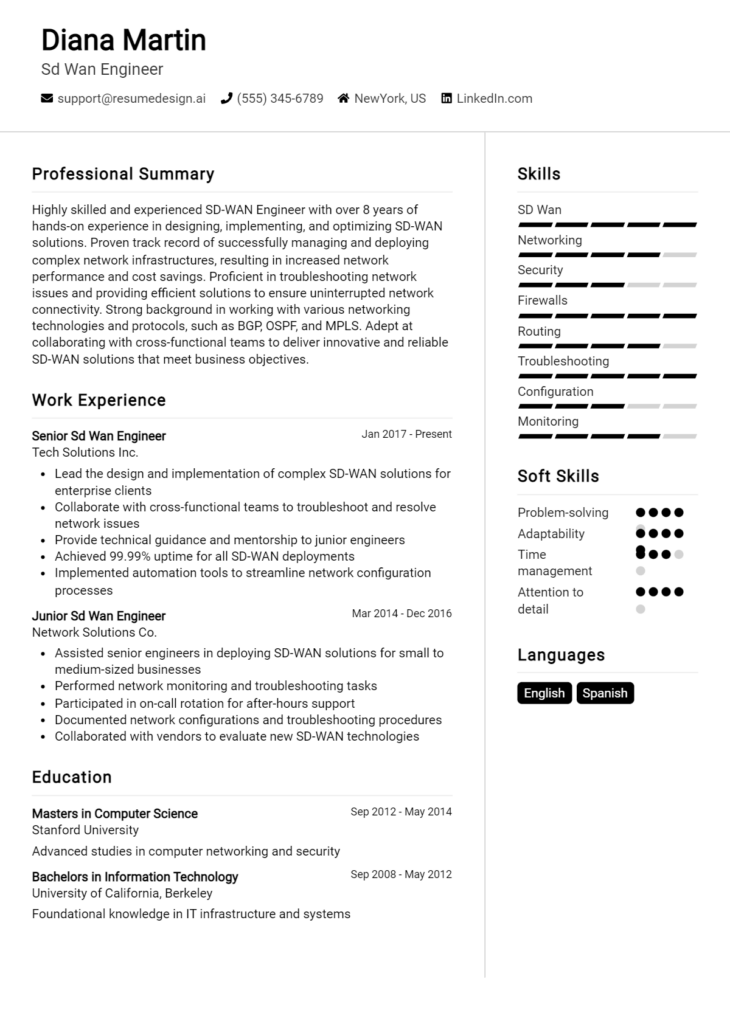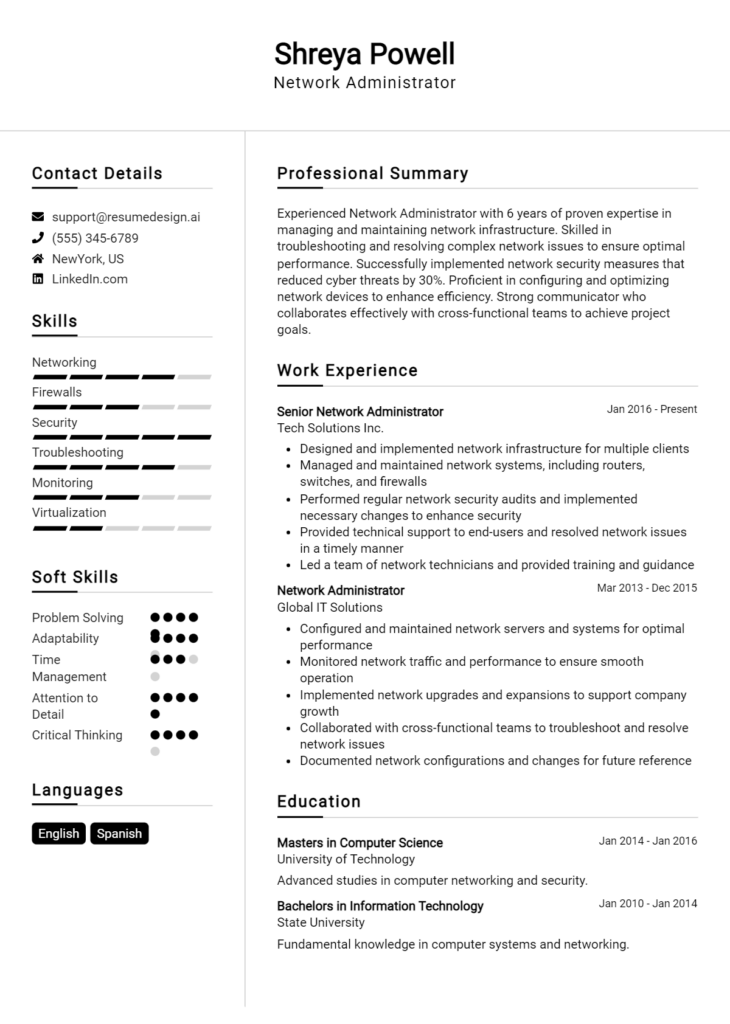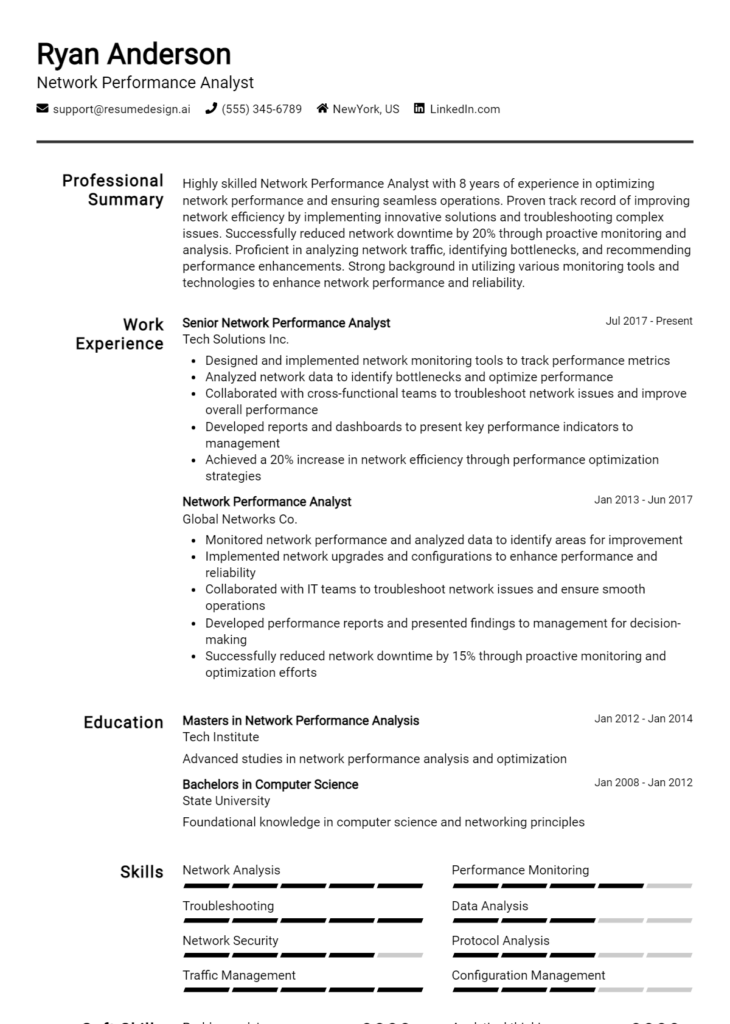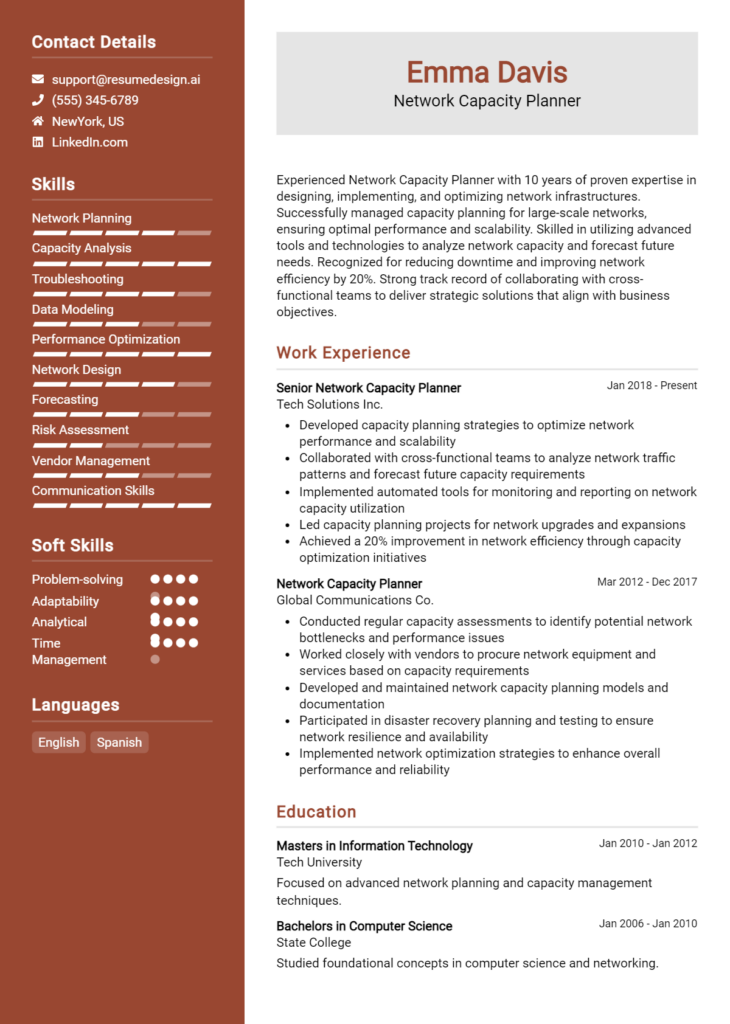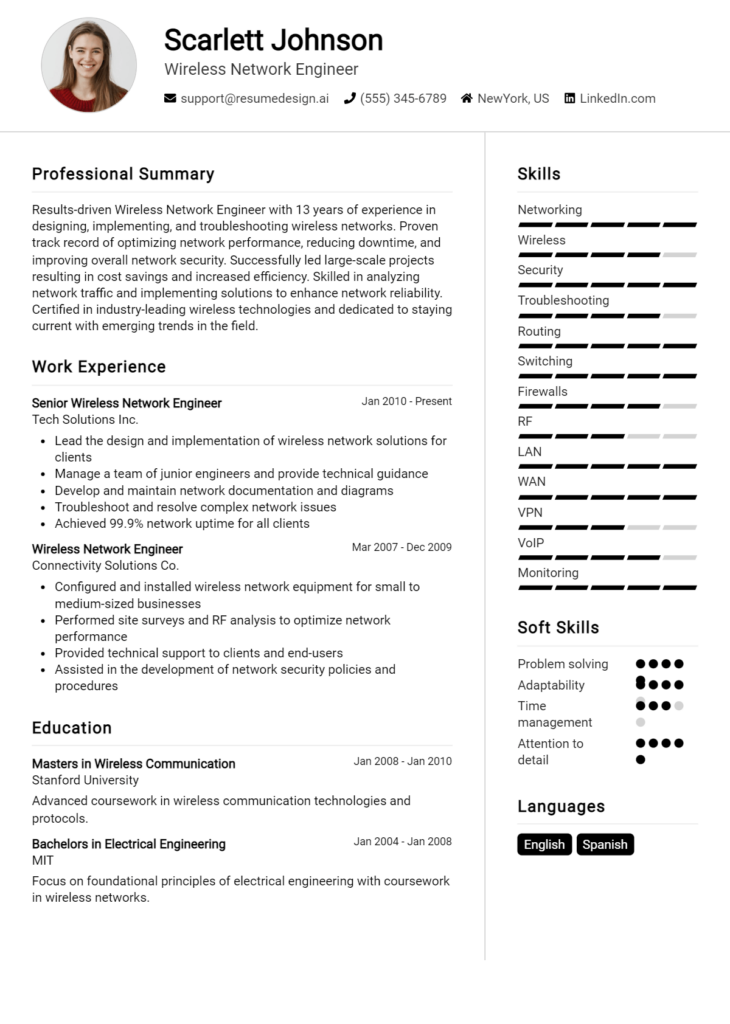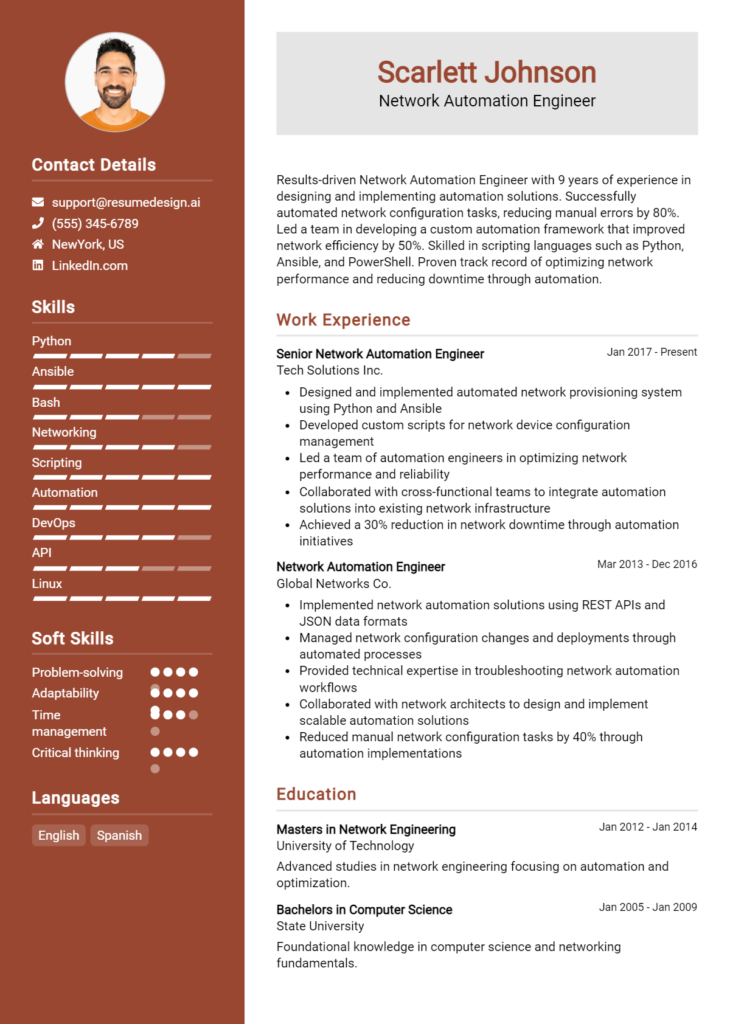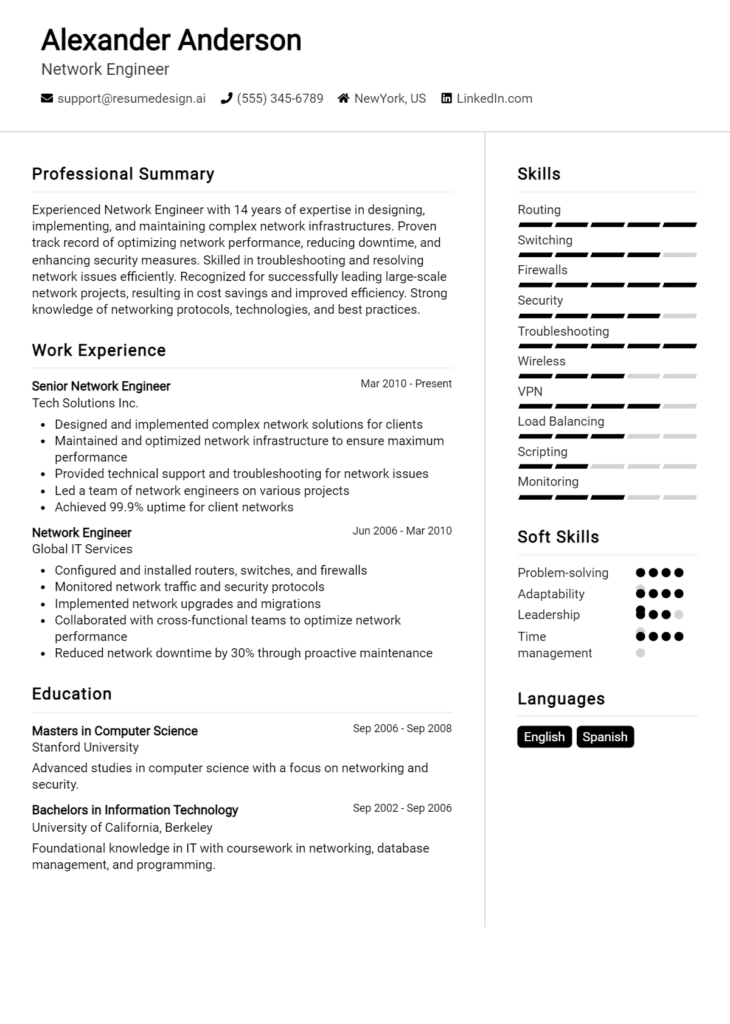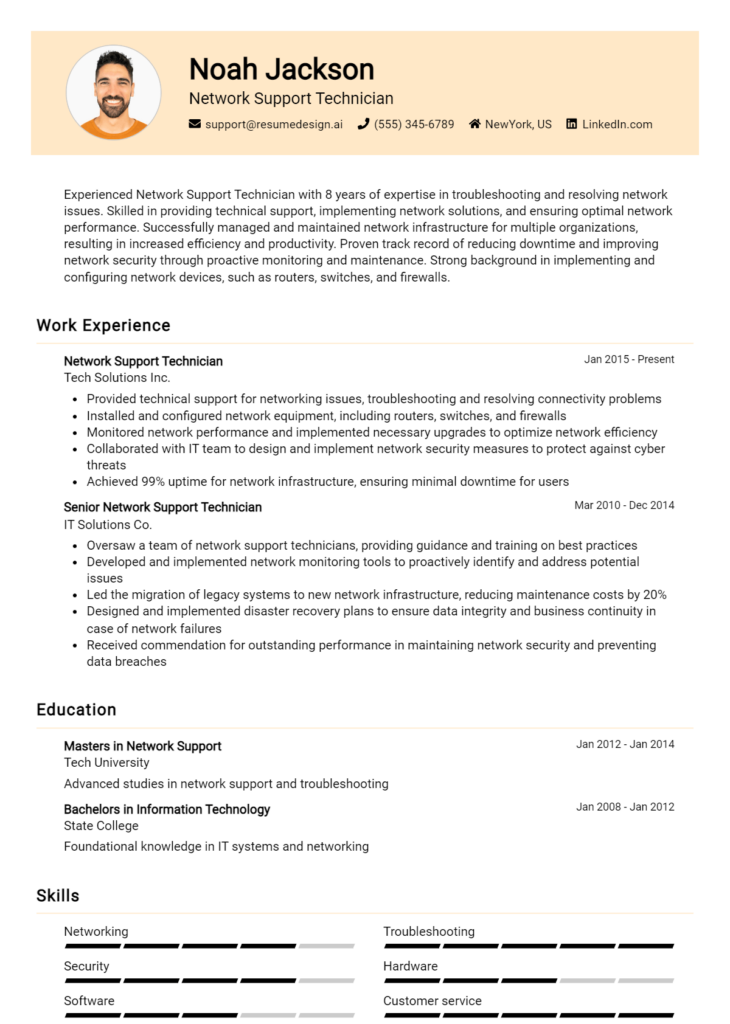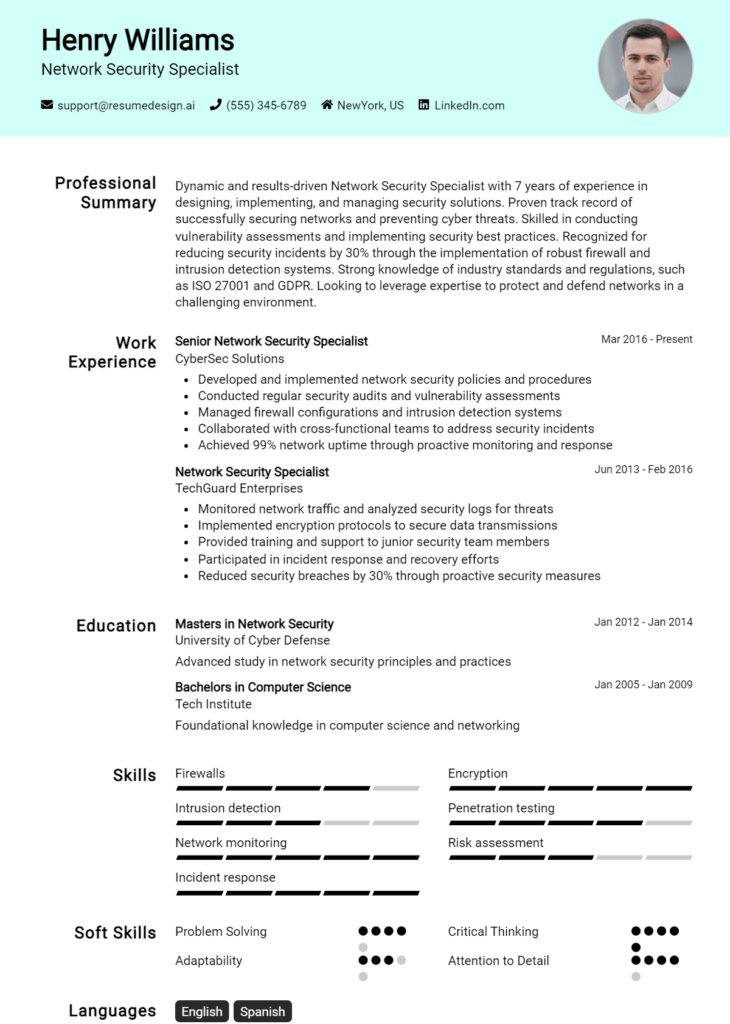Network Penetration Tester Core Responsibilities
A Network Penetration Tester is responsible for identifying and exploiting vulnerabilities in an organization's network infrastructure to enhance security measures. This role requires a blend of technical expertise, operational insight, and strong problem-solving skills. By collaborating with IT, security, and compliance teams, the tester ensures that security protocols are robust and effective. Mastery of tools and techniques for intrusion detection and risk assessment is essential. A well-structured resume can effectively showcase these competencies, aligning with the organization's overarching goal of safeguarding sensitive information.
Common Responsibilities Listed on Network Penetration Tester Resume
- Conducting vulnerability assessments and penetration tests on networks and systems.
- Analyzing security architectures and recommending enhancements.
- Developing and executing test plans to identify weaknesses.
- Documenting findings and providing actionable remediation strategies.
- Collaborating with IT teams to implement security solutions.
- Staying updated on the latest security trends and threats.
- Conducting social engineering assessments to evaluate human factors.
- Training staff on security awareness and best practices.
- Preparing detailed reports for stakeholders regarding vulnerabilities.
- Utilizing various tools for network scanning and exploitation.
- Participating in incident response and recovery planning.
- Engaging in continuous learning to refine penetration testing skills.
High-Level Resume Tips for Network Penetration Tester Professionals
In the competitive field of network penetration testing, a well-crafted resume serves as your first and often only chance to make a positive impression on potential employers. A resume is more than just a document; it is a marketing tool that showcases your technical skills, relevant experience, and professional achievements. For network penetration testers, this means clearly demonstrating your expertise in identifying vulnerabilities, executing tests, and providing actionable insights. In this guide, we will offer practical and actionable resume tips tailored specifically for network penetration tester professionals, ensuring that your resume stands out in a crowded job market.
Top Resume Tips for Network Penetration Tester Professionals
- Tailor your resume to the specific job description by incorporating relevant keywords and phrases to demonstrate alignment with the position.
- Highlight your experience with various penetration testing frameworks and methodologies, such as OWASP, NIST, or PTES.
- Quantify your achievements with concrete numbers, such as the percentage of vulnerabilities identified or the reduction in security incidents during your tenure.
- Showcase certifications relevant to the field, such as Certified Ethical Hacker (CEH), Offensive Security Certified Professional (OSCP), or CompTIA Security+.
- Include a dedicated section for technical skills that lists software, tools, and programming languages you are proficient in, such as Metasploit, Burp Suite, or Python.
- Detail your experience with different environments (cloud, on-premise, hybrid) and the types of systems you have tested (web applications, networks, mobile apps).
- Incorporate any experience with compliance standards and regulations (like GDPR, PCI DSS) to demonstrate your understanding of industry requirements.
- Utilize a clean and professional layout that is easy to read, ensuring your most relevant information stands out.
- Keep your resume concise, ideally limited to one or two pages, focusing on the most impactful information that showcases your qualifications.
By implementing these tips, you can significantly increase your chances of landing a job in the network penetration tester field. A targeted and polished resume not only highlights your relevant skills and achievements but also demonstrates your commitment to the profession, making you a more attractive candidate to potential employers.
Why Resume Headlines & Titles are Important for Network Penetration Tester
The role of a Network Penetration Tester is crucial in today's digital landscape, where cybersecurity threats are becoming increasingly sophisticated. A well-crafted resume headline or title can serve as the first impression a hiring manager has of a candidate, making it an essential component of any resume. A strong headline not only grabs attention but also effectively summarizes the candidate’s key qualifications in a concise and impactful manner. This brief phrase should be relevant to the specific job being applied for, ensuring that it resonates with the hiring manager and highlights the candidate's unique skills and experiences in network penetration testing.
Best Practices for Crafting Resume Headlines for Network Penetration Tester
- Keep it concise: Aim for one to two impactful phrases that summarize your qualifications.
- Be role-specific: Use keywords and terminology relevant to network penetration testing.
- Highlight key strengths: Focus on skills, certifications, or experiences that set you apart.
- Use action words: Start with strong verbs to convey confidence and proactivity.
- Tailor for each application: Customize the headline for the specific position you are applying for.
- Avoid jargon: Ensure clarity by using terms that are widely understood in the industry.
- Include measurable achievements: Whenever possible, integrate quantifiable successes into your headline.
- Stay professional: Maintain a formal tone while still being engaging and compelling.
Example Resume Headlines for Network Penetration Tester
Strong Resume Headlines
Certified Ethical Hacker with 5+ Years in Vulnerability Assessment and Penetration Testing
Experienced Network Penetration Tester Specializing in Advanced Threat Simulation
Skilled Cybersecurity Professional with Proven Track Record in Network Defense Strategies
Weak Resume Headlines
Network Tester
Cybersecurity Expert
The strong headlines are effective because they clearly communicate specific qualifications and expertise relevant to the role of a Network Penetration Tester, making them more likely to catch a hiring manager's eye. In contrast, the weak headlines lack specificity and do not provide any insight into the candidate's skills or accomplishments, which may leave a hiring manager uninterested or confused about the candidate's actual capabilities.
Writing an Exceptional Network Penetration Tester Resume Summary
A well-crafted resume summary is crucial for a Network Penetration Tester as it serves as the first impression for hiring managers. This brief yet impactful section quickly captures attention by highlighting key skills, relevant experience, and notable accomplishments that align with the specific job role. A strong summary not only demonstrates the candidate's expertise in identifying security vulnerabilities and recommending solutions but also showcases their ability to contribute to the organization's cybersecurity efforts. By being concise and tailored to the job description, the resume summary sets the tone for the rest of the application, making it an essential component in securing an interview.
Best Practices for Writing a Network Penetration Tester Resume Summary
- Quantify achievements: Use numbers and statistics to showcase your impact, such as the percentage of vulnerabilities identified or the number of security tests conducted.
- Focus on relevant skills: Highlight specific skills such as penetration testing methodologies, risk assessment, and familiarity with tools like Metasploit or Burp Suite.
- Tailor the summary: Customize your summary for each job application by incorporating keywords and phrases from the job description.
- Keep it concise: Aim for 2-4 sentences that clearly convey your value without unnecessary jargon.
- Showcase certifications: Mention relevant certifications such as CEH, OSCP, or CISSP to establish credibility and expertise.
- Highlight problem-solving abilities: Emphasize your ability to identify security gaps and provide actionable recommendations.
- Include industry experience: Reference any experience in specific sectors, such as finance, healthcare, or government, to demonstrate your versatility.
- Use strong action verbs: Start sentences with impactful verbs to convey a sense of proactivity and accomplishment.
Example Network Penetration Tester Resume Summaries
Strong Resume Summaries
Results-driven Network Penetration Tester with over 5 years of experience in identifying and mitigating cybersecurity risks. Successfully reduced security breaches by 30% through comprehensive vulnerability assessments and robust security measures.
Certified Ethical Hacker (CEH) skilled in employing advanced penetration testing techniques, including social engineering and network exploitation. Conducted over 100 security audits, which led to a 25% improvement in the overall security posture of client networks.
Dynamic cybersecurity professional with expertise in penetration testing and risk assessment. Leveraged Metasploit and Burp Suite to discover and remediate over 150 vulnerabilities, enhancing client compliance with industry standards.
Weak Resume Summaries
Network Penetration Tester with experience in cybersecurity. I am looking for a new opportunity to use my skills.
Experienced in security testing and analysis. I have worked on various projects and am eager to contribute to a new team.
The strong resume summaries effectively highlight specific achievements, skills, and relevance to the Network Penetration Tester role, making them compelling and engaging. They quantify results and showcase the candidate's ability to make significant contributions to an organization’s cybersecurity. In contrast, the weak summaries lack detail and specificity, failing to capture the reader's interest or convey the candidate's value, thus missing the opportunity to stand out in a competitive job market.
Work Experience Section for Network Penetration Tester Resume
The work experience section of a Network Penetration Tester resume is crucial as it serves as a testament to the candidate's technical skills, practical knowledge, and ability to navigate complex security environments. This section not only highlights hands-on experience in identifying vulnerabilities and mitigating risks but also showcases the capability to lead teams, collaborate with cross-functional departments, and deliver high-quality security assessments. Quantifying achievements, such as the number of successful penetration tests conducted or the percentage of vulnerabilities remediated, is vital for demonstrating expertise and aligning experience with industry standards, ultimately making a compelling case for the candidate's qualifications.
Best Practices for Network Penetration Tester Work Experience
- Clearly outline your technical skills relevant to penetration testing, including tools and methodologies used.
- Quantify your achievements to showcase the impact of your work, such as reduction in vulnerabilities or improvement in security posture.
- Highlight leadership roles where you managed teams or projects to enhance collaboration and team effectiveness.
- Include specific examples of successful penetration tests and the results achieved for clients or organizations.
- Align your experience with industry standards and frameworks, demonstrating familiarity with best practices.
- Use action verbs to convey your contributions and responsibilities effectively.
- Tailor your experience to the job description, emphasizing relevant projects and outcomes.
- Showcase your ability to communicate findings clearly to both technical and non-technical stakeholders.
Example Work Experiences for Network Penetration Tester
Strong Experiences
- Led a team of 5 penetration testers in executing over 30 comprehensive security assessments, resulting in a 40% reduction in critical vulnerabilities for client networks.
- Developed and implemented an automated vulnerability scanning process that decreased assessment time by 50%, enhancing overall efficiency in delivering security reports.
- Collaborated with cross-functional teams to remediate 95% of identified vulnerabilities within 60 days, significantly improving the organization’s security posture.
- Conducted a high-profile penetration test for a Fortune 500 company, identifying and addressing security gaps that led to a successful compliance audit with zero findings.
Weak Experiences
- Performed penetration testing tasks as assigned by the manager.
- Participated in some security assessments with limited details on results.
- Helped to find vulnerabilities during audits but did not track or report outcomes.
- Worked on security projects without specifying the technology or methodologies used.
The examples provided illustrate the distinction between strong and weak experiences. Strong experiences are characterized by clear, quantifiable outcomes and active roles in leadership and collaboration, showcasing the candidate's ability to deliver impactful results. In contrast, weak experiences lack specificity, measurable outcomes, and fail to demonstrate the candidate's contributions effectively, which can diminish the overall impression of their capabilities as a Network Penetration Tester.
Education and Certifications Section for Network Penetration Tester Resume
The education and certifications section is a crucial component of a Network Penetration Tester resume, as it serves to showcase the candidate's academic background and industry-specific qualifications. This section emphasizes the importance of formal education and certifications that are pertinent to the field of cybersecurity. By detailing relevant coursework, certifications, and specialized training, candidates can significantly enhance their credibility and demonstrate their commitment to continuous learning and professional development. Employers often look for candidates who not only possess theoretical knowledge but also practical skills validated by recognized certifications, making this section vital for aligning with job requirements.
Best Practices for Network Penetration Tester Education and Certifications
- Include only relevant degrees and certifications that apply to penetration testing and cybersecurity.
- List certifications in order of relevance, starting with the most recognized and respected credentials.
- Provide specific details about coursework that relates to network security, ethical hacking, or risk management.
- Highlight any specialized training programs or workshops that enhance technical skills.
- Keep the formatting consistent and professional for easy readability.
- Update the section regularly to include newly acquired certifications or relevant education.
- Consider including the expiration dates for certifications to show current knowledge and compliance.
- Use bullet points to make the information easily digestible and visually appealing.
Example Education and Certifications for Network Penetration Tester
Strong Examples
- Bachelor of Science in Cybersecurity, University of Information Technology, 2021
- Certified Ethical Hacker (CEH), EC-Council, 2022
- CompTIA PenTest+, CompTIA, 2023
- Advanced Penetration Testing Course, Offensive Security, 2023
Weak Examples
- Bachelor of Arts in English Literature, State University, 2018
- Microsoft Certified Solutions Expert (MCSE), Microsoft, 2016
- Basic Computer Skills Training, Local Community College, 2020
- Certificate in Basic Networking, Online Platform, 2019
The strong examples are considered effective because they directly relate to the skills and knowledge required for a Network Penetration Tester role, showcasing both relevant degrees and recognized industry certifications. In contrast, the weak examples lack relevance to cybersecurity and penetration testing, including outdated or unrelated qualifications that do not effectively demonstrate the candidate's expertise or alignment with the job requirements.
Top Skills & Keywords for Network Penetration Tester Resume
In the competitive field of cybersecurity, a well-crafted resume for a Network Penetration Tester not only highlights technical proficiency but also emphasizes essential soft skills that set candidates apart. As organizations increasingly rely on robust security measures to protect their data and infrastructure, showcasing a blend of hard and soft skills becomes crucial. These skills not only demonstrate a candidate's technical capabilities but also their ability to communicate effectively, work collaboratively, and adapt to evolving security challenges. By focusing on both skill sets, candidates can create a compelling narrative that resonates with potential employers and underscores their readiness to tackle complex penetration testing tasks.
Top Hard & Soft Skills for Network Penetration Tester
Soft Skills
- Problem-solving
- Critical thinking
- Communication
- Teamwork
- Adaptability
- Attention to detail
- Time management
- Analytical skills
- Creativity
- Project management
Hard Skills
- Proficiency in penetration testing tools (e.g., Metasploit, Burp Suite)
- Knowledge of network protocols (e.g., TCP/IP, UDP)
- Vulnerability assessment and management
- Experience with scripting languages (e.g., Python, Bash)
- Familiarity with security frameworks (e.g., OWASP, NIST)
- Understanding of operating systems (e.g., Linux, Windows)
- Network architecture and design
- Experience with firewalls and intrusion detection systems
- Knowledge of cryptography principles
- Regulatory compliance (e.g., GDPR, HIPAA)
For more insights on how to effectively present your skills and work experience, consider exploring additional resources to enhance your resume.
Stand Out with a Winning Network Penetration Tester Cover Letter
I am writing to express my interest in the Network Penetration Tester position at [Company Name] as advertised on [Job Board/Company Website]. With a strong background in cybersecurity and extensive experience in network penetration testing, I am excited about the opportunity to contribute to your team and help safeguard your organization’s digital infrastructure. My hands-on experience, combined with my commitment to staying updated on the latest security threats and technologies, positions me well to identify vulnerabilities and strengthen your network security posture.
In my previous role at [Previous Company Name], I successfully led multiple penetration testing projects, utilizing tools such as Metasploit, Nmap, and Wireshark to uncover potential security weaknesses. I performed thorough assessments on various network architectures, employing both manual and automated testing methods to ensure comprehensive coverage. My ability to analyze results and communicate findings to both technical and non-technical stakeholders has been instrumental in driving remediation efforts and fostering a culture of security awareness within the organization.
I hold a [relevant certification, e.g., CEH, OSCP, or CISSP] and have completed several professional development courses focused on advanced penetration testing techniques and network defense strategies. I am particularly drawn to [Company Name] because of its commitment to innovation and excellence in cybersecurity. I am eager to leverage my skills to not only identify and mitigate vulnerabilities but also to work collaboratively with your team to develop proactive security measures that align with industry best practices.
Thank you for considering my application. I look forward to the opportunity to discuss how my background, skills, and enthusiasms for network security can contribute to the ongoing success of [Company Name]. I am excited about the possibility of joining your team and am eager to bring my expertise in penetration testing to enhance your security framework.
Common Mistakes to Avoid in a Network Penetration Tester Resume
When crafting a resume for a Network Penetration Tester position, it's crucial to present your skills and experience in a clear and compelling manner. However, many applicants make common mistakes that can undermine their chances of landing an interview. By avoiding these pitfalls, you can enhance your resume and better showcase your qualifications in this competitive field.
Lack of Specificity: Failing to provide detailed examples of your skills and experiences can make your resume vague. Instead of listing generic responsibilities, highlight specific projects you worked on and the tools you used.
Ignoring Relevant Certifications: Not mentioning pertinent certifications, such as CEH, OSCP, or CompTIA PenTest+, can weaken your resume. These credentials demonstrate your commitment to the profession and validate your skills.
Overusing Technical Jargon: While some technical language is necessary, overloading your resume with jargon can alienate hiring managers. Strive for a balance that showcases your expertise without being overly complex.
Neglecting Soft Skills: Focusing solely on technical skills can lead to an incomplete picture of your qualifications. Including soft skills like communication, teamwork, and problem-solving is essential, as they are vital for collaboration in security teams.
Poor Formatting: A cluttered or difficult-to-read resume can detract from your qualifications. Use clear headings, bullet points, and a logical layout to ensure your resume is easily navigable.
Failure to Tailor the Resume: Sending out a generic resume without customizing it for each job application can hurt your chances. Tailor your resume to highlight the skills and experiences that are most relevant to the specific role.
Omitting Quantifiable Achievements: Not including measurable results from your past work can leave your accomplishments feeling unsubstantiated. Whenever possible, quantify your achievements to demonstrate the impact of your work (e.g., “Identified and mitigated X vulnerabilities, reducing potential attack vectors by Y%.”).
Ignoring the Importance of Keywords: Many companies use Applicant Tracking Systems (ATS) that scan for specific keywords. Neglecting to include relevant keywords from the job description can result in your resume being overlooked.
Conclusion
As we have explored the essential skills and responsibilities of a Network Penetration Tester, it is clear that this role is critical in safeguarding organizations against cyber threats. Key points covered include the importance of having a strong foundation in network protocols, familiarity with penetration testing tools, and the necessity of keeping up with the latest cybersecurity trends. Additionally, the ability to communicate findings effectively to stakeholders is paramount for success in this role.
Now that you understand the key competencies required for a Network Penetration Tester, it is time to ensure your resume reflects these qualifications. A well-crafted resume can significantly enhance your chances of landing your desired position.
To assist you in this process, we invite you to explore the various resources available:
- Check out resume templates to find a design that suits your style and profession.
- Utilize the resume builder for a user-friendly experience in creating your resume.
- Browse through resume examples to gain inspiration and understand how to present your skills effectively.
- Don’t forget to create a compelling introduction with our cover letter templates tailored to your industry.
Take action today by reviewing and updating your Network Penetration Tester resume to stand out in the competitive job market!

